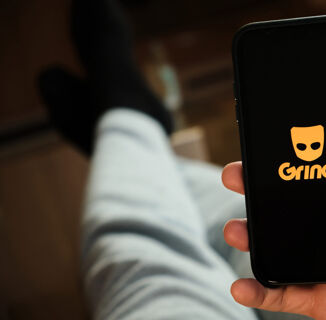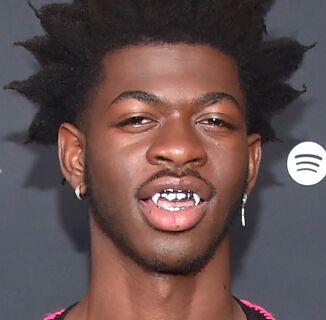“Get out of your comfort zone” is more than just a platitude we see influencers caption their hiking Instagrams with. Along with “Everything happens for a reason” and “What doesn’t kill you makes you stronger,” we’ve adopted this truism as one of the necessary tenets of living a healthy life, and many times, it’s helpful. We do have to push ourselves, extend our boundaries, and try new things in order to grow. In both work and love, we must take risks. When things feel scary, jump — blah blah blah. It’s all true, and I’ve learned some of the most valuable lessons from doing just that in my career and in my personal relationships.
However, I’ve recently realized that, as a queer person — a very anxious-depressive one — this phrase gets tossed my way often, and it’s beginning to irritate me. For queer people, leaving the comfort zone can sometimes feel scarier than it does for cis-het people, because there can be real consequences to doing so.
I began churning this idea in my head over and over again this week, as I just returned home from a European excursion with my family. Half of my family lives in England, so my parents and I stayed with them for the first few days, then my sister and I ventured off to Spain. The trip was overwhelming because I experienced a lot of firsts: It was the first time in my adult life that I’ve gone on vacation, like a real time-off vacation that I could afford to take. It was also the first time I’ve been in a foreign country without my parents or my entire extended family, which sounds freeing, right? In actuality, I spent the majority of the trip coming to terms with how padded and cushioned my life as a lesbian in Los Angeles is, and it was jarring.
Compared to some of the horror stories I’ve heard, I had a pretty “chill” coming out experience. I was, blessedly, surrounded by friends and family who have always embraced progressive ideals, and no one really batted an eyelash when I finally said it out loud. And since coming out, I have experienced very little homophobia, at least to my face. Of course, homophobia manifests in more subtle ways: It tickles the back of my skull as I recall schoolyard bullying, and how I grew up thinking “gay” was a bad thing. Sometimes there are glaring divides in my relationships with childhood friends who have obtuse questions like “Don’t you miss sex?” But as far as direct or aggressive homophobia goes, I’ve been unbelievably lucky in dodging gay slurs, being disowned, or facing violence.
In L.A., I’ve always known that I live in a bubble. Here, almost all of my friends are queer, and I never think twice with them when I delve into some gruesome story about my dating life, or a war story from the bedroom. And as a politically invested queer writer and a Person In The World, I’m highly aware of the horrors that LGBTQ people suffer all over the country, and elsewhere in the world. I’m very privileged. I know this — which is why traveling was so frightening.
During one particularly high-stress moment in London, the day before I embarked on my Spanish jaunt, I opened up to one of my family members about the rising anxiety I was feeling about being, well, surrounded by solely straight people 24/7. I was told, lovingly, that I needed to “get out of my comfort zone.” And even though I’ve been given this advice countless times, and listened to it a number of times, this felt different.
There’s a difference between getting out of your comfort zone — where you’re guarded, fearing the unknown, unwilling to try new things — and leaving a safe space, your place of refuge when your literal wellbeing is called into question. For queer people, venturing out of your bubble, where your safety is almost guaranteed, can have real, dangerous consequences.
Once, I had to go to a wedding in Trumpville, USA and actively chose to omit my queerness when certain people asked about my life. I spent time around an extremely Christian family last week, and I was unsure how they would react if/when they found out I was gay. It’s scary. Cis-het people don’t ever have to be on the edge of their seat, dreading when the people around them will find out who they truly are, wondering how they’ll react, and if they’ll be safe when they do.
Across the world, LGBTQ people are being targeted, marginalized, pushed to suicide, even slaughtered on a daily basis—I mean literally daily. This week, a heartbreaking story broke about a nine-year-old in Colorado who came out as gay, was subsequently bullied and told to kill himself, and then committed suicide soon after. Day after day, we see gutting stories about transgender people being murdered, or about queer women of color being killed, or about violent homophobes butchering their gay roommate. Unfortunately, the world is not a shiny, happy place for LGBTQ people, and that’s a cold, hard reality to face as a privileged gay woman.
So, when I went to Mallorca and sat at a beach club that was clearly mired in a culture that lauds and promotes heterosexuality, and there wasn’t one (visible) queer person in sight, I was worried. Being the only queer person in a room can feel very unsettling, and even if you aren’t the only one, sometimes it feels like you stick out like a sore thumb. I felt that in England around my entire extended family. I felt that on the beach in Mallorca. I felt it at that southern wedding, surrounded by conservative, religious people.
I’m an optimist, and my first instinct is always to trust the good in people. But I fear that, because I’ve been so coddled in L.A., where queerness is lurid and ubiquitous, I won’t have my guard up when I might need to. I never want to be put in a situation where I have to hide who I am, but unfortunately, that often is how I feel when I leave L.A. For that reason, I don’t think it’s dramatic or over-the-top to be fearful of any room that is both predominantly (or wholly) straight and outside of my bubble.
My anxieties are valid. My sexuality is denigrated in many places, punishable by death in others. So it’s not a comfort thing. It’s a safety thing. From this trip, I learned not to “leave my comfort zone” if my very wellbeing is called into question. Luckily, it wasn’t — but sometimes it’s OK to choose protecting yourself over taking a risk.
Image via Getty
Help make sure LGBTQ+ stories are being told...
We can't rely on mainstream media to tell our stories. That's why we don't lock our articles behind a paywall. Will you support our mission with a contribution today?
Cancel anytime · Proudly LGBTQ+ owned and operated
Read More in Culture
The Latest on INTO
Subscribe to get a twice-weekly dose of queer news, updates, and insights from the INTO team.
in Your Inbox














